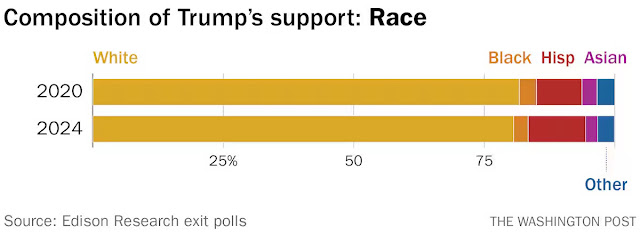I'm not very knowledgable about Rep. Seth Moulton (D-MA), but he seems to be making a name for himself by promoting the idea that the Democrats lost in 2024 because they are too "woke." Yesterday the Washington Post published an op-ed by Moulton with these opening paragraphs.
Since Election Day, I’ve learned two things about the Democratic Party: The word police will continue to patrol no matter how badly we lose, and a growing number of us are finally ready to move beyond them to start winning again.
Two days after Donald Trump’s victory, I gave an example of how Democrats spend too much time trying not to offend anyone, even on issues where most Americans feel the same way. Speaking as a dad, I said I didn’t like the idea of my two girls one day competing against biological boys on a playing field. My main point, though, is what I said next: “As a Democrat, I’m supposed to be afraid to say that.”
The Congressman went on the relay that, after making those remarks, the local Democratic Party condemned them and people showed up at his office to protest. Ohhh, the horror!
It's also interesting to note that nowhere in Moulton's op-ed does he reference the fact that Republicans are targeting the first transgender women ever elected to congress - Rep. Sarah McBride - with harassment and threats. In his mind, the real threat is that those who disparage transgendered people are being silenced. WOW!
But this is the kind of backward "logic" we're hearing from pundits these days. It reminds me of a conversation I witnessed way back in 2007 between African American, Hispanic, and Native American bloggers in response to this statement from Glenn Greenwald:
It is always preferable to have views and sentiments -- even ugly ones -- aired out in the open rather than forcing them into hiding through suppression. And part of the reason people intently run away from discussions of race...is because it is too easy to unwittingly run afoul of various unwritten speech rules, thereby triggering accusations of bigotry. That practice has the effect of keeping people silent, which in turn has the effect of reinforcing the appearance that nobody thinks about race (which is why nobody discusses it), which in turn prevents a constructive discussion of hidden and unwarranted premises.
At his blog, The Unapologetic Mexican, Nezua responded with this:
In this analysis (or this part of his post at least) the problem is the various unwritten speech rules. But guess what? There really aren't any. There are just poor attitudes we keep about people who look different. Or who we've been taught to think of differently. And there is a "White" attitude of deciding for everyone else how they should live, be, self-identify, and do many other things. There are old slurs and old tropes that hurt people. These are the things that are flushed out when people speak: attitudes, thoughts, beliefs, manners of speaking that hint at lurking attitudes.
People avoid talking about race because they are scared of exposing their thoughts and views on race. They are afraid they are A RACIST. They are not afraid of "unwritten speech rules." They are afraid that what they really think and feel will cause them to be ridiculed or ostracized in public, or that they may see a part of themselves they have to feel bad about. So they keep the potential to themselves.
That conversation on the "diversosphere" went on for days. I learned a lot from all of the bloggers involved and am sad to say that most of their sites have disappeared or gone quiet.
But if we take Nezua's response and apply it to what Moulton wrote up above, you'll see that he referred to transgender females as "biological boys." That indicates that, at best, the congressman knows nothing about the issue and, at worst, he's parroting transphobic talking points. Of course, he's free to say ignorant stuff because there are no "speech rules." But the people who responded are also free to protest that kind of bigotry. Actually, it is imperative that they do so.
As Nezua ended his response, "if we keep the focus on Speech Rules, we miss the opportunity to change ourselves." The truth is that Moulton is upset about the fact that he got called out for his thoughts/attitudes/beliefs about transgender people. Rather than listen and learn, he decided to blame the "word police."





















